#EMTALA
Explore tagged Tumblr posts
Text
#tiktok#donald trump#fuck trump#us politics#us government#president trump#trump#trump administration#trump is the enemy of the people#trump's america#emtala#reproductive health#reproductive freedom#reproductive rights#pro choice#fuck donald trump#emergency abortions#abortion is healthcare#abortion is a human right#abortion is a right#abortion is essential#healthcare#abortion
31 notes
·
View notes
Text
HOSPITALS ARE LOSING THEIR MINDS TRYING TO IMPLEMENT THIS
labor and delivery wards have become immigration checkpoints
imagine you're a hospital administrator on July 27, 2025, when this policy goes live. what the actual fuck do you do?
THE MORNING MEETING FROM HELL
Hospital CEO: "So... we need to check immigration status before issuing birth certificates now"
Legal Counsel: "But EMTALA says we can't"
HR Director: "Staff are threatening to quit"
IT Director: "Our systems literally can't do this"
Risk Management: "We're going to get sued either way"
THE IMPOSSIBLE PAPERWORK
For EVERY birth, hospitals now need:
Mother's documents:
Immigration status
Visa type and expiration
Entry date
Legal status at conception(?!)
Father's documents:
Same as above
But what if father unknown?
What if father disputes?
What if multiple possible fathers?
THE SYSTEMS THAT DON'T EXIST
Hospitals need to:
Verify immigration documents (how??)
Check federal databases (which ones??)
Confirm authenticity (are we ICE now??)
Do this during LABOR AND DELIVERY
Nobody has these systems!
THE ETHICAL NIGHTMARE FOR DOCTORS
Hippocratic Oath: "First, do no harm"
Doctor's new reality:
Deliver healthy baby ✓
Deny them citizenship ✗
Create stateless person ✗
Violate medical ethics ✗
THE NURSE REBELLION
Labor & Delivery nurses across the country:
"We're healthcare workers, not immigration agents"
Reports of:
Mass resignation threats
Refusing to collect status info
"Forgetting" to check documents
Civil disobedience in scrubs
THE LEGAL LIABILITY CHAOS
Hospitals can be sued for:
Following federal order (by states)
Not following federal order (by feds)
Discrimination (by families)
Malpractice (by everyone)
Legal departments in meltdown.
THE REAL SCENARIOS PLAYING OUT
Scenario 1: Woman in active labor arrives Husband fumbling for documents Baby crowning "MA'AM WE NEED YOUR VISA"
Scenario 2: Teen mother, no ID Father unknown Baby born Now what? Stateless by default?
Scenario 3: Parents have different statuses Divorce proceedings ongoing Who counts as "father"? Legal clusterfuck
THE DATABASE REQUIREMENTS
Hospitals need access to:
USCIS systems
State Department visa records
ICE databases
Birth parent verification
NONE OF THESE EXIST FOR HOSPITALS
THE PRIVACY VIOLATIONS
HIPAA vs. Immigration enforcement:
Medical privacy protected
But must share for citizenship
Conflicting federal laws
Lawsuits inevitable
THE EMERGENCY ROOM CRISIS
EMTALA (Emergency Medical Treatment Act):
Can't turn away emergencies
Can't ask status before treatment
But must ask for birth certificate?
Federal law fighting federal law.
THE TECHNOLOGY DISASTER
Hospital IT systems:
Built for medical records
Not immigration verification
Integration costs: $10-50M per hospital
Timeline: 2-3 years minimum
But policy starts NOW.
THE STAFF TRAINING IMPOSSIBILITY
Need to train:
Doctors on immigration law
Nurses on document verification
Registrars on visa types
Security on document fraud
With what budget? What time?
THE ACTUAL FORMS BEING CREATED
"Birthright Citizenship Determination Form"
15 pages
200+ fields
Requires legal attestation
In active labor???
THE STATE VS. FEDERAL FORMS
California: "Use our citizenship certificate" Feds: "Use our non-citizen certificate" Hospital: "WE HAVE BOTH NOW WHAT"
THE INSURANCE CHAOS
Insurance companies:
Cover citizens differently
Need status for billing
Denying coverage for stateless
Creating healthcare apartheid
THE PUBLIC HEALTH DISASTER
Women avoiding hospitals:
Home births skyrocketing
Prenatal care plummeting
Maternal mortality rising
Infant deaths increasing
All predictable. All preventable.
THE SECURITY CONCERNS
Hospitals becoming targets:
Protests at entrances
ICE wanting access
Families desperate
Violence potential high
THE WHISTLEBLOWER CASES
Hospital workers reporting:
"We're falsifying documents"
"Administration ordering discrimination"
"Babies being trafficked"
"This is genocide"
THE INTERNATIONAL DOCTORS
Foreign-trained doctors on visas:
Their own kids affected
Treating stateless babies
Moral injury off charts
Many leaving medicine
THE COST EXPLOSION
Implementation costs per hospital:
Legal compliance: $5M
IT systems: $20M
Training: $3M
Security: $2M
Lawsuits: ???
THE CATHOLIC HOSPITAL CRISIS
Catholic hospitals (15% of US beds):
Religious duty to protect life
Moral obligation to dignity
Can't participate in creating stateless
Facing federal punishment
THE MEDICAL RECORDS NIGHTMARE
How to record:
"US Born: Yes"
"US Citizen: No"
Makes no sense
Systems can't handle
THE PEDIATRIC FOLLOW-UP
Pediatricians asking:
Can stateless babies get vaccines?
School physical forms?
Medicare eligibility?
Nobody knows
THE TRANSFER PROBLEMS
Baby needs NICU at different hospital:
Transfer requires documentation
What documents for stateless?
Insurance coverage?
Legal guardian rights?
THE UNION RESPONSE
Healthcare unions:
Filing grievances
Refusing unsafe work
Protecting members from liability
Considering strikes
THE DAILY ABSURDITY
Actual hospital conversation: "Congratulations on your baby girl!" "Is she American?" "Well, that depends on your visa expiration date" "...what?" "Welcome to 2025"
THE BOTTOM LINE
Hospitals are being forced to:
Become immigration enforcers
Violate medical ethics
Create impossible systems
Destroy patient trust
All to harm babies
This isn't healthcare. This is healthcare held hostage.
And everyone knows it's insane.
GOTO NEXT POST -> CLICK HERE
GOTO FIRST POST -> CLICK HERE
#hospitals#healthcare#implementation#medical ethics#labor and delivery#emtala#hipaa#nurses#doctors#public health
13 notes
·
View notes
Text
#tictok#abortion#abortion bans#pro choice#us politics#fuck republicans#vote blue#idaho#texas#us supreme court#us vs Idaho#emtala#very important
70 notes
·
View notes
Photo
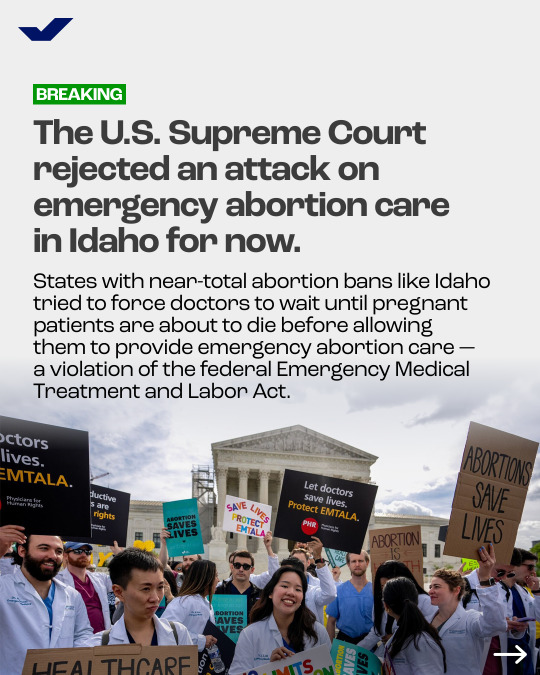
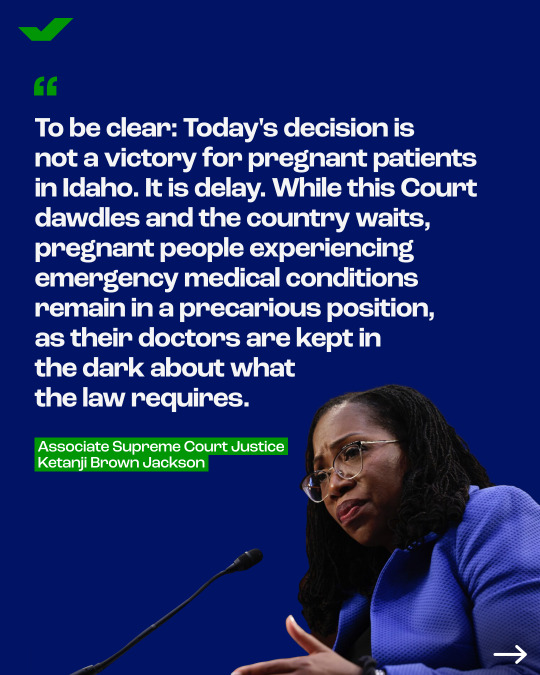
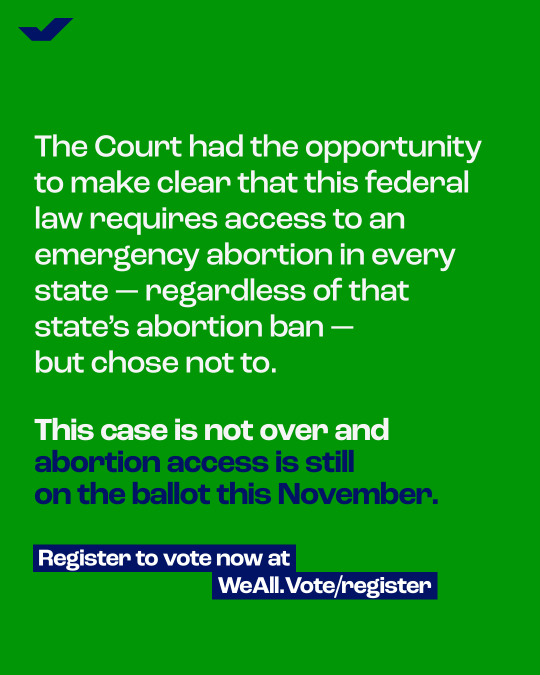
BREAKING: In a 6-3 ruling, the U.S. Supreme Court rejected an attack on emergency abortion care in Idaho, for now, despite the state’s near-total abortion ban.
These are life or death situations — but instead of making it clear that federal law requires access to abortion in an emergency in every state regardless of the state’s abortion ban, the Court chose not to.
Everyone should have access to life-saving emergency medical care. As litigation in this case will continue in the lower courts, the fight for abortion access is on the ballot in at least 12 states this November. Register to vote — and ask three friends and family members to register, too — at weall.vote/register.
#SCOTUS#supreme court#abortion#abortion rights#reproductive rights#reproductive health#reproductive healthcare#idaho#ketanji brown jackson#vote#register to vote#EMTALA#emergency#healthcare
24 notes
·
View notes
Text
Republicans are killing women on purpose. They knew this would happen. They know it's happening now. They do not care. It will keep happening as long as they have any power at all at the federal and state level.
This is a different case in the same state. I'm putting them in the same post because I feel like there's a pattern and something needs to be done.
#Abortion#Georgia#Abortion Ban#Candi Miller#Federal Law#Amber Thurman#US Senate#Ron Wyden#The Emergency Medical Treatment and Labor Act#EMTALA#News
13 notes
·
View notes
Text
A fascinating listen from the NYT podcast "The Daily" about the federal government's push to combat some of the most extreme abortion bans using a 1980s federal law called EMTALA. I will note that this is not the ONLY attempt to combat the restrictions, but that a greater pushback is still reliant on tipping the House and Senate left by enough to pass abortion protections. In the meantime, this partial fix is intended to address the issue of dangerous medical complications that are routinely going unaddressed or directed out of state due to the fear of repercussions for "not being truly life-threatening."
This coverage includes audio recordings of Supreme Court questions during the period on which they heard arguments.
For an explanation on how "life of the mother" is inadequate and vague, may I suggest Mama Doctor Jones (a registered ob/gyn from Texas who is currently practicing in New Zealand.) She has a number of videos on this topic, but this one addresses one of the extreme situations that are brought up in the arguments and questioning:
youtube
#abortion#Supreme Court#united states#EMTALA#scotus#phoenix politics#current events#new york times#the daily#mama doctor Jones#miscarriage#Spotify#Youtube
26 notes
·
View notes
Text
https://healthlaw.org/news/update-on-the-texas-v-becerra-lawsuit/
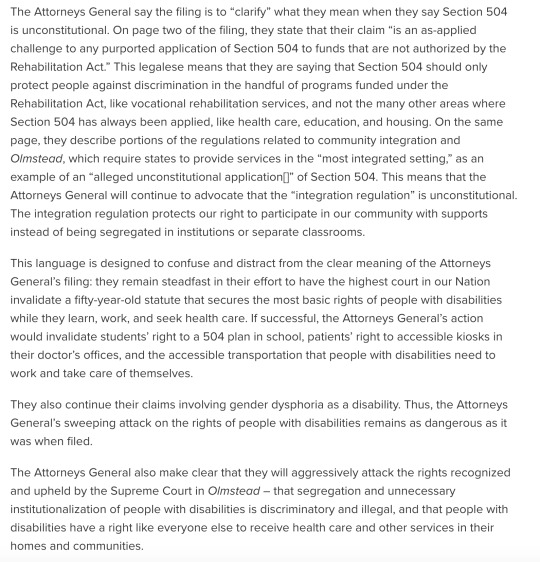
so this is basically 17 attorney generals with nothing better to do than try and target an already-struggling demographic (seriously. anybody ever look up how US disability coverage is basically mandated poverty, and I mean BAD poverty) and force them to be unable to participate in all the crucial parts of american society, like:
educational institutions
healthcare providing locations
aannnnnnd employment
so basically they wanna live in a nation where if you work a blue collar job and lose a limb in an industrial accident, you have no recourse if all the support systems in society basically deny you accommodation and request that you just go die quietly in some corner and stop inconveniencing everybody
say nothing of all the folks who already GOT one or more disabilities and can't return to sender - hey isnt this the same court case that wants to make it illegal for hospitals to use abortion as emergency life-saving treatment for expecting mothers when the pregnancy goes really, really wrong?
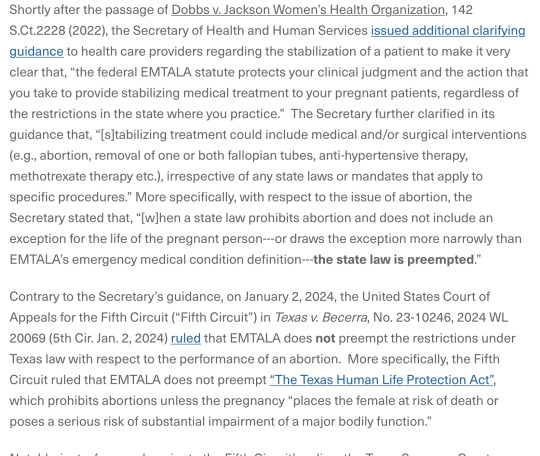
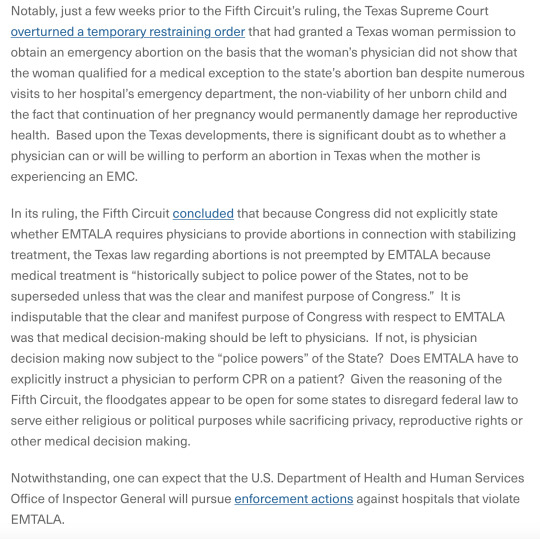
yup! same motherfuckers!
so only 17 states are filing this case, BUT if ur not in one of those states, you can still contact your state's Attorney General and ask that they support/defend Section 504 and the EMTALA - also contacting your state's reps in Congress would be a good move right about now, tell them the same thing!

#wow they really just hate...everybody#schrodinger's human rights#u have human rights like access to medical care until ur existence makes conservative politicians pissy and then u shouldn't get them#texas v. becerra#section 504#emtala#i learned a new thing today
4 notes
·
View notes
Text
#tiktok#rep Kelly Morrison#Kelly Morrison#obgyn#congress#us congress#emtala#fuck trump#donald trump#us politics#us government#president trump#trump#trump administration#trump is the enemy of the people#trump's america#fuck donald trump#abortion is healthcare#abortion saves lives#abortion is a human right#abortion is a right#abortion is essential#reproductive rights#reproductive health#reproductive freedom
8 notes
·
View notes
Text
When you vote for president, you are voting for the person who appoints federal judges – including those on the US Supreme Court. When you vote for US senator, you are voting for one of the people who confirms those judges.
Federal judges have lifetime appointments. So bad choices for president or senator live on long past the four-year or six-year terms of the elected officials who put those judges on the bench.
If you want to know what a fully Trumpified federal judiciary would be like, check out the US Court of Appeals for the Fifth Circuit. It covers Texas, Louisiana, and Mississippi. The Fifth Circuit makes the current US Supreme Court look liberal and capable.
The latest atrocity from the Fifth Circuit involves a decision where a state law forbidding abortion takes precedence over the survival of woman seeking emergency treatment.
The case is Texas v. Becerra, and all three of the United States Court of Appeals for the Fifth Circuit’s judges who joined this opinion were appointed by Republicans. Two, including Kurt Engelhardt, the opinion’s author, were appointed by former President Donald Trump. The case involves the Emergency Medical Treatment and Labor Act (EMTALA), a federal statute requiring hospitals that accept Medicare funds to provide “such treatment as may be required to stabilize the medical condition” of “any individual” who arrives at the hospital’s ER with an “emergency medical condition.” (In limited circumstances, the hospital may transfer the patient to a different facility that will provide this stabilizing treatment.) EMTALA contains no carve-out for abortion. It simply states that, whenever any patient arrives at a Medicare-funded hospital with a medical emergency, the hospital must offer that patient whatever treatment is necessary to “stabilize the medical condition” that caused the emergency. So, if a patient’s emergency condition can only be stabilized by an abortion, federal law requires nearly all hospitals to provide that treatment. (Hospitals can opt out of EMTALA by not taking Medicare funds but, because Medicare funds health care for elderly Americans, very few hospitals do opt out.) This federal law, moreover, also states that it overrides (or “preempts,” to use the appropriate legal term) state and local laws “to the extent that the [state law] directly conflicts with a requirement of this section.” So, in states with sweeping abortion bans that prohibit some or all medically necessary abortions, the state law must give way to EMTALA’s requirement that all patients must be offered whatever treatment is necessary to stabilize their condition. It is important to emphasize just how little EMTALA has to say about abortion. EMTALA does not protect healthy women who wish to terminate their pregnancies. Nor does it preempt any state regulations of abortion, except when a patient is experiencing a medical emergency and their doctors determine that an abortion is the appropriate treatment. But when an emergency room patient presents with a life-threatening illness or condition — or, in the words of the EMTALA statute, that patient has a condition that places their health “in serious jeopardy,” that threatens “serious impairment to bodily functions,” or “serious dysfunction of any bodily organ or part” — then Medicare-funded hospitals must provide whatever treatment is necessary. The Texas case, in other words, asks whether a state government can force a woman to die, or suffer lasting injury to her uterus or other reproductive organs, because the state’s lawmakers are so opposed to abortion that they will not permit it, even when such an abortion is required by federal law. And yet, despite the fact that the EMTALA statute is unambiguous, and despite the fact that this case only involves patients whose life or health is threatened by a pregnancy, three Fifth Circuit judges told those patients that they have no right to potentially lifesaving medical care.
Of course the ruling by the Fifth Circuit lacks basic logic. If the mother dies, the fetus is likely lost as well anyway. d'oh!
All three judges on the panel are Republicans – two having been appointed by Trump. Don't expect judicial genius from these folks.
Engelhardt’s opinion is surprisingly brief for such a consequential decision, and for one that reads a straightforward federal law in such a counterintuitive way. The section of the opinion laying out Engelhardt’s unusual reading of this federal law is only about eight pages long — yet it contains at least three separate legal errors.
This case will probably end up before SCOTUS. The best we should expect is for the Supremos to toss out the decision because of the legal errors made by the Fifth Circuit.
But in the long run, to protect reproductive freedom it's necessary to keep Republicans out of the White House and out of the majority in the Senate for the foreseeable future.
Be A Voter - Vote Save America
#abortion#the sanctity of reproductive freedom#reproductive freedom#a woman's right to choose#texas v. becerra#emtala#the federal courts#trump judges#us court of appeals for the fifth circuit#kurt engelhardt#us supreme court#donald trump#election 2024#vote blue no matter who
14 notes
·
View notes
Text
Jill Filipovic at Slate:
Should the very state of being pregnant place women in a subclass of citizen, vulnerable to criminal prosecution or civil penalties for behavior that would be perfectly legal from a nonpregnant person? Judging by their proposed legislation and various legal antics, the anti-abortion movement says: Yes. Pregnant women simply should not have the same rights as any other U.S. citizen. Take, for example, efforts to criminalize the crossing of state lines for abortion. There is a very, very long tradition in the U.S. of allowing people to travel out of state to access medical care, and it’s so deeply ingrained we barely think about it. Consider, for example, the businesswoman who lives in New Jersey but works in New York City and so goes to the dentist in midtown Manhattan, or the dad who lives on the Kansas side of Kansas City but takes his sick kid to a specialist at a hospital on the Missouri side. A great many Americans don’t think twice about crossing state lines for health care. Abortion opponents are trying to change that for one group of people: pregnant women.
Conservative legal groups are already drafting model legislation to prevent pregnant women from traveling for abortions by legally penalizing anyone who helps them, a strategy used by the state of Texas in one of its abortion bans, which allows anyone in the U.S. to sue those who assist women with abortions—and be rewarded with a bounty paid by the state. The architect of that Texas abortion bounty law was Jonathan Mitchell, an anti-abortion activist (and Donald Trump lawyer) who is currently representing a Texas man in his quest to probe into his ex-girlfriend’s abortion, which she allegedly sought outside of their home state. Mitchell filed a petition to learn the details of this woman’s abortion for, he says, a potential future lawsuit. But to be clear, the woman in question did absolutely nothing illegal: Traveling out of state for health care, including abortion, is not against the law in Texas or anywhere else. It’s just that Mitchell and other abortion opponents would like to change that—and are apparently happy to represent controlling (and, in another case Mitchell took on, allegedly abusive) men to do it.
They’re also happy to reclassify pregnant women as a kind of sub-citizen who, by simple virtue of their pregnancy status, are not entitled to the same legal freedoms and protections as anyone else. A Texas woman who goes to a Colorado abortion clinic is being treated differently from any nonpregnant person who travels for a medical procedure—and you can bet that this categorization of pregnant people as suspect, should they travel out of state, will lead to all sorts of investigations and abuses.
Take this hypothetical: Say the anti-abortion movement succeeds and makes it a crime to travel out of state for an abortion. Say a woman in Idaho (where abortion laws are so extreme, they have no exceptions for saving a woman’s health) travels to Washington state, where abortion is legal, and gets her hands on abortion-inducing drugs. Say she’s not pregnant. Say she takes the drugs anyway. Has she committed a crime? Or, to use a more likely legal model, say Texas makes it a crime to help a woman travel for an abortion, and a Texas woman goes to Colorado, gets abortion-inducing drugs, and takes them, despite not being pregnant. Is the friend who helped buy her plane ticket still liable? Presumably not: No pregnancy means no abortion, which means no violation of an abortion ban. But if the two women in these scenarios had been pregnant, the legal calculus would be entirely different.
Or to use a perhaps more realistic scenario: Mifepristone, an abortion-inducing drug, is also commonly used to treat Cushing’s syndrome, and researchers say it has tremendous potential to treat other illnesses, too, from various cancers to PTSD. Under an anti-abortion legal scheme, if a Texas woman with Cushing’s syndrome travels out of state, gets mifepristone, and takes it, she (or those who help her) would face potential legal consequences only if she’s pregnant. It’s her status as a pregnant woman—not the act of traveling or even taking an abortion-inducing drug—that is the problem. And generally, the law frowns on making a person’s status—rather than their actions—the basis of a crime or a lawsuit. That’s part of treating all people equally under the law, and offering all people the equal protection of it.
Preventing pregnant women from crossing into a state for a legal medical procedure isn’t the only way in which the anti-abortion movement is attempting to curtail basic rights and protections for anyone carrying a pregnancy. Earlier this year, abortion opponents argued before the Supreme Court that pregnant patients should be treated differently than nonpregnant ones in cases of serious medical emergencies—that doctors and other health workers should be permitted to give pregnant women a substandard level of care, and to essentially refuse to appropriately stabilize them. If a woman comes in and is very ill, she’s entitled to one standard of care; if she comes in and is very ill and pregnant, that standard of care is lower in states that criminalize abortion.
At issue in the Supreme Court case, a ruling in which is expected early this summer, is the Emergency Medical Treatment and Labor Act (EMTALA), a law initially written to prevent hospitals from dumping seriously ill patients who couldn’t pay. Pregnant women in particular were often coming into hospitals in labor, only to be refused care; there were stories of women birthing in hallways and cars. EMTALA says that any hospital receiving federal Medicaid dollars (which is most hospitals, both public and private) must provide lifesaving care to anyone who walks through their doors, regardless of their ability to pay. That means that hospitals have an obligation to stabilize ill patients. (If they don’t have the ability to appropriately stabilize a patient, they must move the patient to a facility that does.)
Jill Filipovic wrote in Slate the insidious trend of anti-abortion hardliners making pregnant people 2nd class citizens by enacting laws criminalizing access to out-of-state abortion services (this is also applicable to gender-affirming care).
#Jill Filipovic#Slate#Abortion#Pregnancy#War On Women#Anti Abortion Extremism#Texas SB8#Jonathan Mitchell#Criminalization of Abortion#SCOTUS#EMTALA#Moyle v. United States#Idaho v. United States#Mifepristone
94 notes
·
View notes
Text
#abortion#abortion rights#emtala#us supreme court#idaho#texas#us politics#important#medical emergency#pro choice#fuck republicans#fuck the united states#us vs moyle
26 notes
·
View notes
Text
This is infuriating and horrifying, but not particularly surprising.
#emtala#abortion bans#abortion rights#abortion care#abortion access#reproductive justice#reproductive rights#abortion care is healthcare
2 notes
·
View notes
Text
Happy New Year! Let’s Do a Rewind! The Take With Tammy The Health Coach @sambiencebtg @BurbNBougie
Tammy the Health Coach reads a post commentary from an ER nurse on the fragility of the US emergency medical system and what cuts to federal funding would do to that system. We read the post in its entirety, and we thought to ourselves: “We need to rewind this and play it back for everybody to hear (or read).” So here it goes.
youtube
Note: The post is found in the subreddit: r/economicCollapse. It is posted by user: u/AintMuchToDo. The post’s title is: You need to prepare for the collapse of the US emergency medical system.
#EmergencyMedicine#HealthcareCrisis#ERNurse#MedicalEmergency#HealthCareSystem#PrepareForTheWorst#EMTALA#RuralHealthcare#NursingCommunity#PublicHealth#HealthAwareness#emergencypreparedness
#EmergencyMedicine#HealthcareCrisis#ERNurse#MedicalEmergency#HealthCareSystem#PrepareForTheWorst#EMTALA#RuralHealthcare#NursingCommunity#PublicHealth#HealthAwareness#EmergencyPreparedness#healthcoach#selfcare#womenshealthcare#abortionrights#womenshealth#Youtube
1 note
·
View note
Text
CJ court watch - EMTALA case
SCt refused on Mon, 7oct24 to hear the case of Becerra v. Texas, 23-1076. That means the 5th Cir. judgment remains in effect.
Becerra is the Secretary of Health & Human Services. He had told Texas that its abortion prohibition violated the Emergency Medical Treatment and Active Labor Act. Texas sued in the U.S. District Court for the Northern District of Texas. That court ruled in favor of Texas, and Becerra appealed to the U.S. Court of Appeals for the 5th Cir.
EMTALA says a hospital must provide treatment to protect an "individual's health and, in the case of a woman in labor, the health of the unborn child." 42 U.S.C. §1395dd. Examination and treatment for emergency medical conditions and women in labor. (2024). Hard to argue that an abortion would protect an unborn child's health.
The 5th Cir., ruling against Becerra, said
The question before the court is whether EMTALA, according to HHS's Guidance, mandates physicians to provide abortions when that is the necessary stabilizing treatment for an emergency medical condition. It does not. We therefore decline to expand the scope of EMTALA.
The 5th Cir. affirmed an injunction that said
(1) The defendants may not enforce the Guidance and Letter's interpretation that Texas abortion laws are preempted by EMTALA; and (2) The defendants may not enforce the Guidance and Letter's interpretation of EMTALA both as to when an abortion is required and EMTALA's effect on state laws governing abortion within the State of Texas or against AAPLOG's members and CMDA's members.
[American Association of Pro-Life Obstetricians & Gynecologists (AAPLOG) and Christian Medical & Dental Associations (CMDA)]
After losing in both lower courts, Becerra then appealed to SCt.
Given that AAPLOG and CMDA operate throughout the US, this ruling may have wide effect.
The 5th Cir's opinion in Texas v. Becerra, No. 23-10246 (2024) is linked.
0 notes
Text




Latest for The New York Times
By Pam Belluck
Anna Nusslock never expected to be denied an emergency abortion by a hospital in California, a state with some of the strongest abortion rights protections.
In February, Dr. Nusslock, 36, a chiropractor in Eureka, Calif., went to the nearest emergency room, at Providence St. Joseph Hospital, after her water broke just 15 weeks into pregnancy. Doctors said one of the twins she was carrying would not survive and the other had almost no chance, according to medical records. They said that if the pregnancy was not terminated, she could face infection, hemorrhaging and threats to her future fertility.
But because fetal heart tones could still be detected, a doctor at the Catholic-affiliated hospital said the institution’s policy prohibited providing abortion unless Dr. Nusslock’s life was at risk, according to her medical records. After several hours, her husband drove her to the next closest hospital, where she arrived hemorrhaging and passing a blood clot the size of an apple. She expelled one fetus and was rushed into the operating room so the other fetus could be removed, records show.
“I thought I would be safe here from things like this,” Dr. Nusslock said in an interview, “from people taking away choices from me and leaving me in danger.”
Similar situations have occurred in states with abortion bans, but California’s attorney general, Rob Bonta, said in an interview that Dr. Nusslock’s case shows they can happen “even in California, a place that is very strongly pro-choice.”
On Monday, the attorney general filed suit against the company that operates Providence St. Joseph, charging that the hospital violated a California law requiring hospitals with emergency rooms to provide care to prevent not only death, but “serious injury or illness.”
Read more below
https://www.nytimes.com/2024/09/30/health/california-abortion-lawsuit-st-joseph-hospital.html
#abortion#pro choice#healthcare#women's reproductive rights#roe vs wade#abortion rights#abortion bans#emtala
0 notes
Text
The day she went to an emergency room — cramping and bleeding at 18 weeks pregnant — Kansas voters were heading to the polls to vote in favor of keeping abortion legal in that state. Farmer went to the emergency room at Freeman Health���s emergency department in Joplin at her OB-GYN’s urging. There, medical staff determined the pregnancy was no longer viable, but because the fetus had a heartbeat, and because Farmer’s condition wasn’t immediately life-threatening, she was turned away. According to the lawsuit, doctors told Farmer that she was at risk of infection, severe blood loss, the loss of her uterus and death. But they would not help her because of Missouri’s abortion ban, which had only been in place for several weeks, outlawing all abortions except for in cases where the mother’s life is at risk. Farmer then traveled three hours across the border to a hospital in Kansas, where abortion is limited after 22 weeks gestation. However, doctors at the University of Kansas Health System also refused to perform an abortion. Kansas law bans abortions at any facilities run by the University of Kansas Hospital Authority, with exceptions only for the life of the mother.
1 note
·
View note